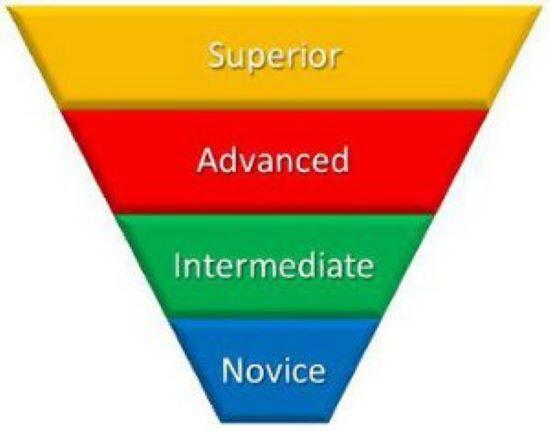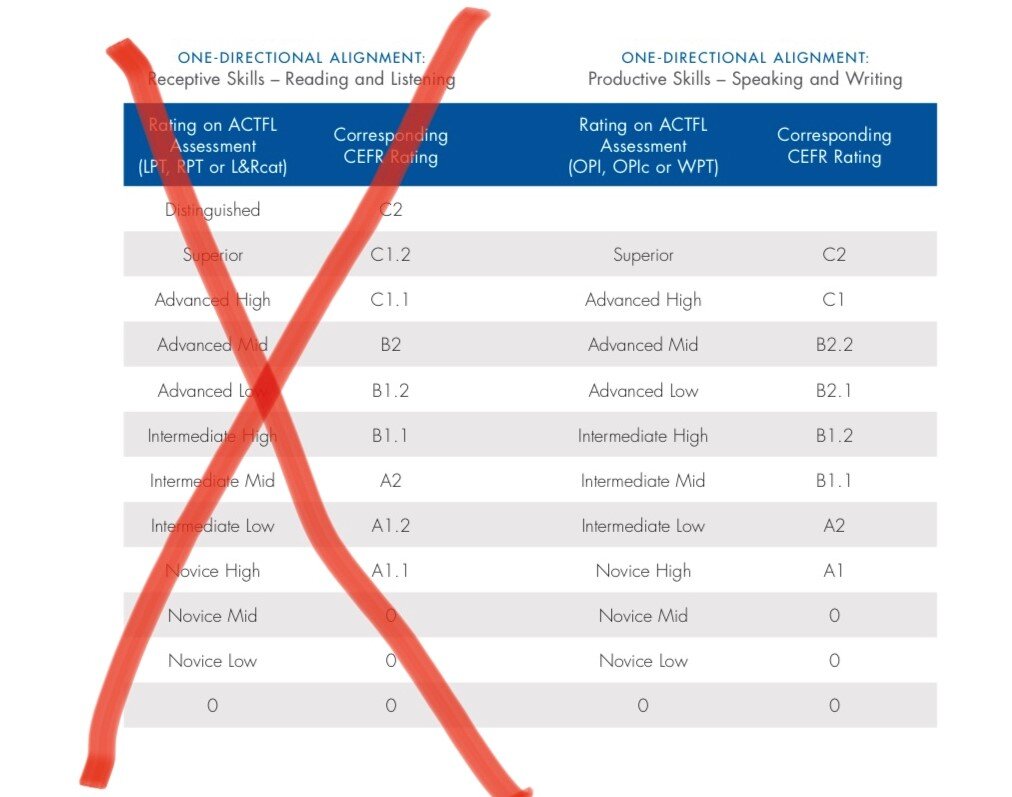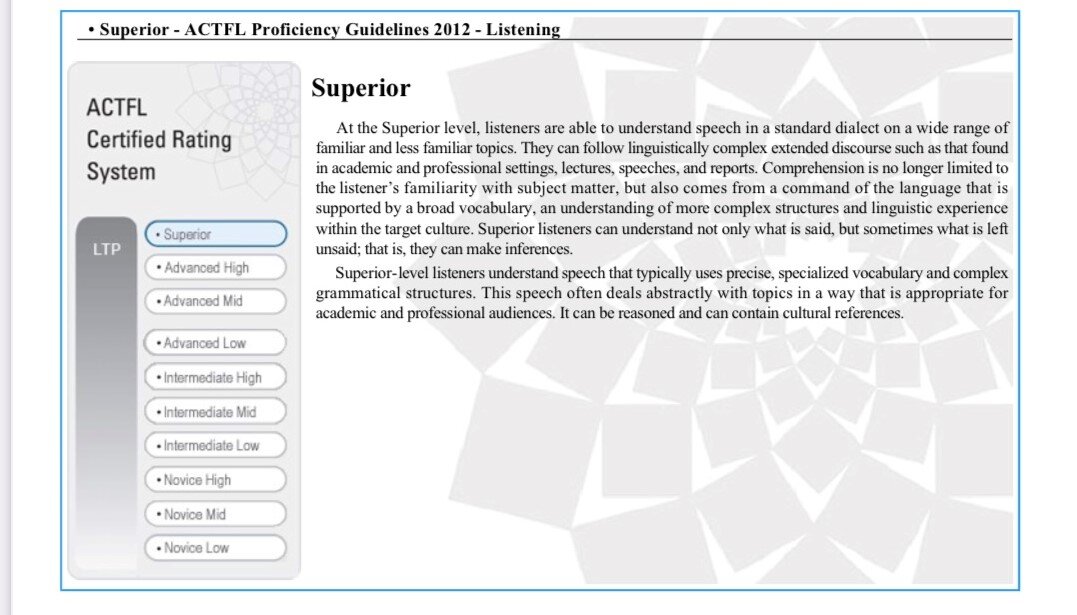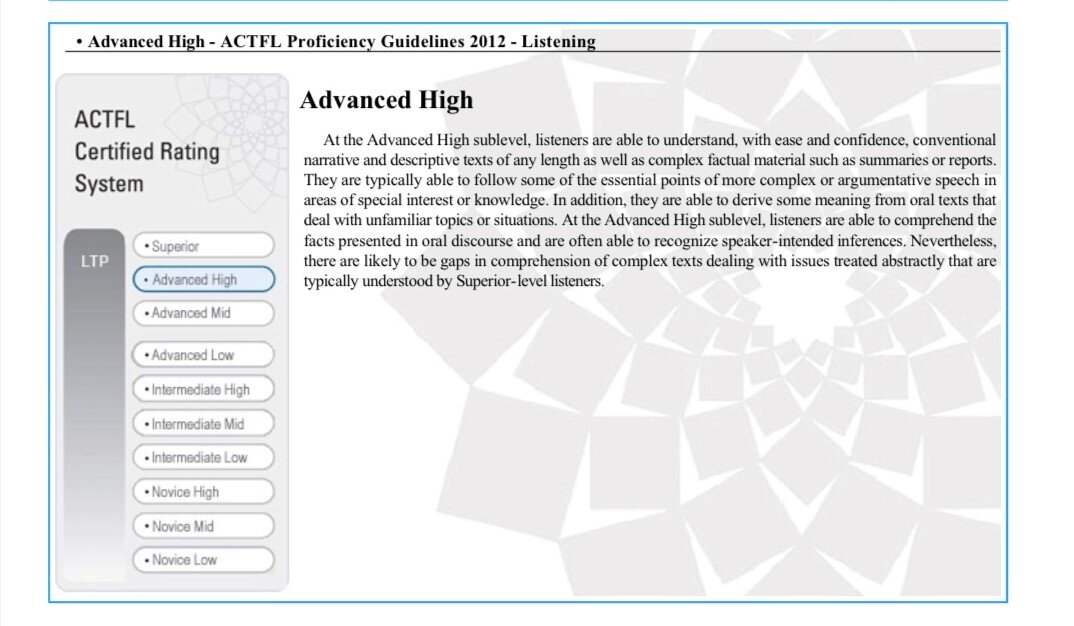
The American Council On The Teaching Of Foreign Languages (ACTFL) is one of the most popular advocates of foreign language education. ACTFL creates official standards and administers exams to assess language competency in over 120+ languages. Language Testing is their official partner, and they offer official proctored, on-demand exams seven days a week, that test reading, listening, writing, and speaking skills.

You may already be familiar with the CEFR Scale (Common European Framework of Reference), which ranges from A1 to C2. See the following graph for translating results from ACTFL to CEFR.
A quick note on the ACTFL LPT (language proficiency test) itself. The listening exams consist of around ~15 short audio segments ~one minute a piece, followed by three questions each. You may find that your exam gets easier as you progress, more difficult, or more or less stays the same, depending on how you perform early on. The listening, like the reading, is a dynamic exam designed to “probe your level. If you are in the Advanced High / Superior range, the listening “clips” are likely to get progressively more difficult.
Recently I took LPT tests in Spanish and Arabic. In Spanish, I scored Superior (C2), whereas in Arabic I scored Advanced High (C1). I’ve posted the certificates down below, complete with a complete description of each level. I figured I would make a post outlining some important things to keep in mind, both in preparation for, and on the day of, the exam. While the title of this blog is tailored to advanced learners, these tips will help you do better at any level, and some of the tips are transferable to both the reading and speaking exams.
FYI, the first three tips are relevant before the day of the exam, while the last two apply to test day.
5 Pro Tips To Improve Your ACTFL LPT Score
1-) Master The Material You Will Be Tested On. Both the Spanish and Arabic exams, and I’m pretty sure all the listening exams ACTFL administers, are tests of the formal variant of a language. In Spanish, that means the kind of language you will hear on CNN En Español, the news more generally, cultural and educational programs, and some informal exchanges using standard Spanish. What you will likely not hear is any slang characteristic of Central America, South America, the Caribbean, or regional pronunciation. None of my knowledge of Mexican Spanish, which is pretty vast, helped me in any way with this exam.
As far as Arabic, all of the passages are in Modern Standard Arabic. A few passages had superficial traces of dialect, like the Egyptian pronunciation of the letter qaaf, but nothing more substantive than that. Again, knowledge of spoken Arabic will not help with this exam, unless it is also coupled with direct exposure to formal Arabic, in which case the differences between the two can be worked out.
FYI, all of this info can be found in the prep material provided by ACTFL, which you can access here. ACTFL provides sample audios and a complete description of each level for every language.
2-) Practice Active Listening. This tip applies to training. Obviously, during the test day you will be zeroed in on every audio sample. However, in advance of the test, practice active, not passive listening. It’s one thing to hear something; it’s an entirely different thing to listen to it actively. Listening involves focus and concentration. On the other hand, when we are distracted, we only draw on a fraction of our mental abilities, and our practice time becomes much less productive. When we actively listen, we are able to pinpoint the words and the sounds that give us difficulties.
3-) Look Up New Words. It doesn’t matter how good you are at audibly deciphering words. if you don’t know the meaning, you will either be one, totally clueless; or two, liable to make errors (when you think you understood one thing, but the meaning was different or nuanced). In simple terms, having a broad vocabulary is vital to scoring high. The speakers in the recordings speak clearly, so pronunciation is not really a challenge, but you need to know what most of the words mean right away in order to do well. For years, I made a habit of looking up words all the time, both in Spanish and Arabic (see here), and that made exam day a lot easier.
That said, no matter how advanced you are in a language, you will likely not understand every single word being said; or you may understand what was being said only to forget it, so pay special attention to the next two bullets.
4-) Study The Questions In Advance. Each audio recording will play automatically, but you are given thirty seconds to study the questions in advance (just the questions, not the possible answers, so you don’t have to worry about information overload). Context is the most important thing to understanding any communication. These 30 seconds help you establish the context in advance, which knowledge is a huge aid during the listening portion. The title of the clip and the questions are typically short and relatively simple, so meditate on them during those first 30 seconds so you know exactly what you will be looking for when you listen. Since you only get one listen for each section, it is extremely important to be as clued in on the context as possible.
Remember, you do not need to understand everything to pass each section. You just need to know the answers to the specific questions they ask, which range from the main idea to more specific details.
5-) Take Targeted Notes While Listening. During the exam you are provided a notepad to take notes on each section. Utilize it strategically. You don’t want to be typing too much while listening because you may miss important details, and won’t have the chance to go back and listen again. At the same time, you don’t want to neglect what matters. I jotted down a few words during each clip, which helped me stay focus and remember the key details I was zeroing in on having studied the questions in advance.
For the listening and the reading, the results become available right away, as with a complete description of your level. You are supposed to wait 90 days before taking the same test again, but you may be able to take an individual exam a second time before 90 days, so check their policy online, and give them a call if you are not sure.
Lastly, language is far more dynamic than any exam could ever let on. Doing well or poorly on an exam most directly reflects your ability to take that exam. If you do well, enjoy your result, but don’t think a Superior result means you’ve arrived. The certificates, after all, are only valid for two years, during which time your level can go up or down. Similarly, just because you didn’t get the result you wanted, it doesn’t mean you won’t in the future. And it doesn’t necessarily mean your language level isn’t higher, especially if you are proficient in informal, non-standard varieties that speakers of a language commonly communicate in.
Here are my results as promised from September, 2021:


Have you taken an ACTFL exam before? Drop your two cents down below! If you liked this post, be sure to also check out The Psychology of Speaking In A Foreign Language | The Magic Of Speaking In A Foreign Language | I Have Multiple Personalities (Confessions Of A Linguist) | Travel Is Not The Best Way To Improve Your Foreign Language Skills (The Myth of Immersion) | How Long it Takes to Become Fluent in a Foreign Language | This Daily habit will dramatically increase your foreign language proficiency! | Confessions of a Bilingual: Raw Perspective From A Persian-American Linguist.

[…] If you like this post, check out How To Score Superior (C2) On Official ACTFL Listening Proficiency Test (LPT) (5 Pro Tips!). […]